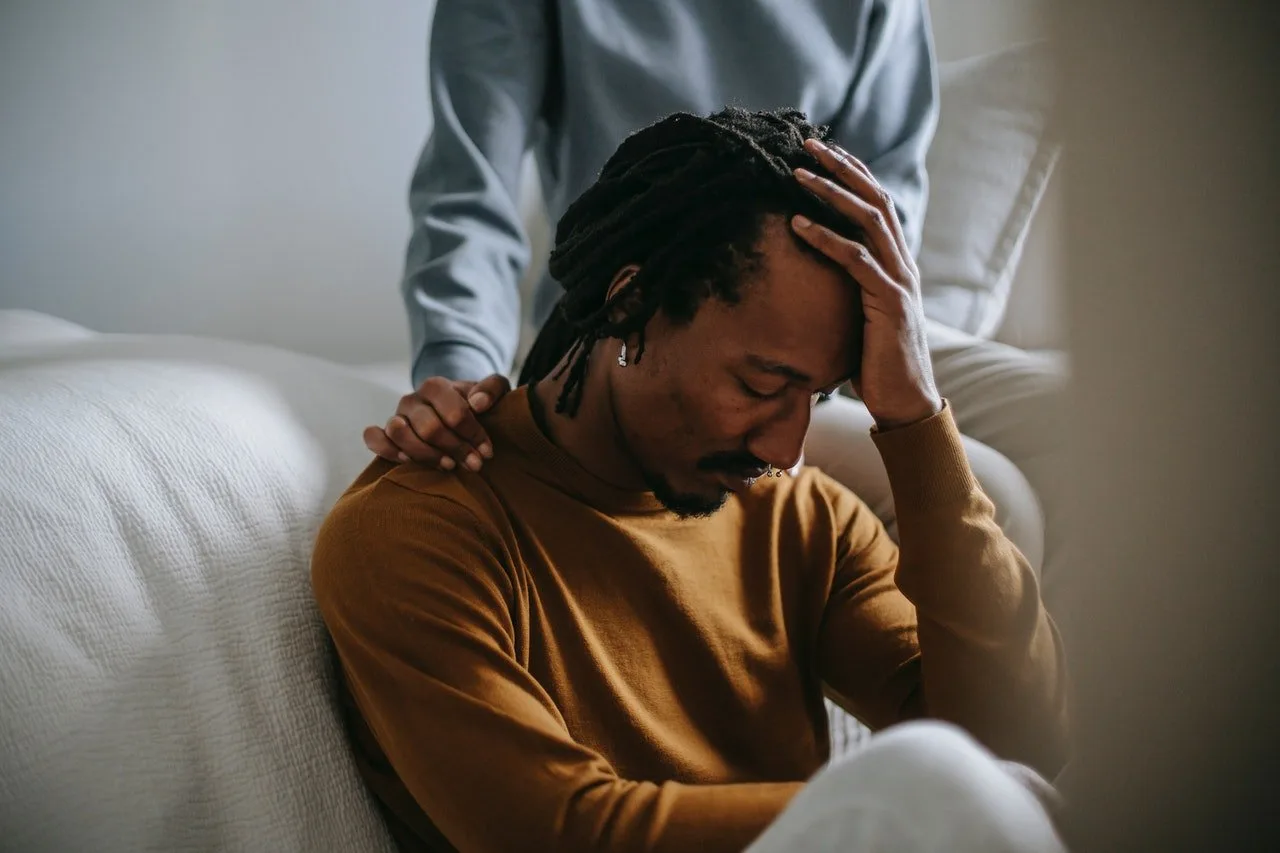Who doesn’t have that voice in their head? You know what I mean: that says you should have called your mother days ago, you should have known the stock market was going to crash. Or you should never have asked your friend for career advice when she’s afraid of losing her job. Guilt.
It’s that feeling in the pit of your stomach that can be hard to shake. Often that’s because you assume it’s the truth. In a recent article entitled How Your Emotions Lie and Why You Believe Them, we quoted Kirsten Lindquist, a professor of psychology and neuroscience at the University of North Carolina at Chapel Hill:
“Your emotional experiences feel like they are the truth of the world around you, when in reality [they] serve as a lens for interpreting the world around you.” – Kirsten A. Lindquist (1)
Healthy Guilt
This is as true for guilt as it is for any other emotion. A 2019 scientific review titled A Theory of Guilt Appeals backs this up, suggesting that guilt may serve as a “cognitive trigger” directing our attention toward reparation. (2) In other words, the feeling can focus your attention on how to make things right.
And that’s a good thing… except when it isn’t. Why? Because not all guilt is created equal. There are different kinds, and it isn’t always possible, or even appropriate, to make things right.
Our lives wouldn’t be the same without healthy guilt. If you’ve said something hurtful, guilt pushes you to take responsibility by apologizing, listening quietly while that person tells you how much it hurt (if they choose to), and taking steps to make sure you don’t make the same mistake again.
“Guilt is good… It occurs when we compare something we’ve done — or failed to do — with our personal values.” — Brené Brown (3)
If you’ve broken a promise, guilt pushes you to find a way to make it up to the person. If you’d rather sleep in than help your best friend paint her living room, guilt (triggered by memories of the many times she’s come through for you) pushes you to show up early with a paintbrush, some music, and snacks. Lots of snacks.
How do you know your guilt is healthy?
We need healthy guilt to nudge us when it’s time to make amends. Of course, it hurts, but the pain is for a good cause. Without it, we might lose some of our most precious relationships.
Here are three clues that the guilt you’re feeling is the healthy kind:
- You own your mistake. You understand what you did and the effect it had, and you want to make things right.
- You violated one of your values, and you can name it: “I lied.” “I broke my promise.” “I shouldn’t have said anything about the weight she’s gained.”
- You’ve learned something about yourself. Maybe you can be blunt, or you tend to jump to conclusions. Learning these kinds of things about yourself allows you to get better… which is exactly what guilt is for.
Toxic Guilt
There’s a big difference between healthy guilt, the kind that helps us stay on track, and toxic guilt, which keeps us trapped. Healthy guilt pushes us to make things right; toxic guilt keeps us stuck in what’s wrong. It does that in a surprising number of ways. Let’s explore a few of the more common ones.
“I should have done more” guilt:
This type of guilt can be healthy or not, depending on the situation. If you’ve gotten busy and haven’t returned your best friend’s calls all week, a little guilt can push you to pick up the phone. But we often feel guilty about things we can’t control.
If your sister refuses to admit she has a drinking problem, you can’t force her to get help. If your brother gets himself fired and loses his house, that’s not on you. When you asked him how he’d pay for it if he lost his job, he laughed. “You worry too much!”
If you lend him that money, you may never see it again – and he won’t change his ways. If he loses the house, he’ll blame everyone who didn’t bail him out. If he keeps it, he’ll keep right on spending.
“I should have seen it coming” guilt:
Sometimes we feel guilty for not having a crystal ball. A month after you start a great job with a good company, a competitor hits the market with a game-changing product, and sales drop overnight. As the newest employee, you’re the first to go.
You’ve always been the one to help your family out financially, and now you need to ask your parents for a loan. Feeling guilty won’t help you find a new job, and it won’t help you make sure something like this never happens again. If you can’t shake the guilt, maybe you’ve become a bit too attached to your role as the family savior.
“I don’t deserve more than anyone else” guilt:
When you see someone you care about working long hours at a low-paying job, it can be easy to feel guilty of your nice life – especially if they resent your success. But you’re not responsible for their situation. If you see an opportunity they might be interested in, you can share it. You can help others by giving your time or money to a good cause. But if you feel wrong for having more than someone else, that’s a problem.
“It must be my fault” guilt:
Some people blame themselves for everything. Were you shamed for the kind of mistakes kids naturally make, like losing things or getting dirty? Were you held responsible for someone else’s emotions? (“Now you’ve upset your mother!”) If so, you might find yourself taking responsibility for other people’s issues and mistakes, because you’re “wired” to blame yourself.
Free-floating guilt:
Psychologists use the terms “generalized” and “free-floating” to describe guilt that isn’t connected to a specific action or situation. Like healthy guilt, these feelings tell you to do better. But unlike the healthy version, they don’t give you a single clue as to what you need to improve. And they never will – because there’s nothing to fix. This kind of guilt might be associated with depression (4) or low self-esteem, or it might be the result of a mental habit from childhood.
“Yes, sir” guilt:
This is an automatic, learned response. The classic example is feeling guilty when one of your parents gives you a disapproving look. You may know they’re being unreasonable, or you may react before you have any idea what the look is about. Either way, your guilt isn’t tied to something you can or should change. The best thing you can do for yourself is to recognize this guilt for what it is and find ways to unlearn it.
Here are three clues that you’re suffering from toxic guilt:
- You don’t know what you did wrong. This might mean someone is trying to manipulate you, or your guilt response is automatic.
- You’ve done everything you possibly could, but the guilt hasn’t subsided. Maybe someone’s still angry with you, and you won’t feel better until they do. (If so, you need to figure out how or why you’re giving them so much power.) Perhaps you have unrealistic expectations and hate the thought of making a mistake. Or maybe there was no mistake, at least not on your part. Sometimes things just happen, and there’s nothing you can do about it.
- You no longer feel guilty, but you don’t feel good. Perhaps someone tried to make you responsible for their emotions or choices, and you let them. You may have apologized or even made sacrifices that weren’t justified. That “not good” feeling could be your resentment toward someone who’s taking advantage of you – or even anger toward yourself for allowing it.
Knowing the Difference Can Make All the Difference
If that nasty feeling just won’t go away, don’t wallow in it. Don’t tell yourself you deserve it, because you don’t. Guilt isn’t a punishment; it’s a message from your subconscious mind. Figure out what it’s telling you, and you’ll be on your way to a happier, more fulfilling life.
References
Graton, A.; Mailliez, M. A Theory of Guilt Appeals: A Review Showing the Importance of Investigating Cognitive Processes as Mediators between Emotion and Behavior. Behav. Sci. 2019, 9, 117.
- https://www.oprah.com/inspiration/life-lessons-we-all-need-to-learn-brene-brown
- https://thecorrespondent.com/86/a-neuroscientists-guide-to-what-happens-in-your-brain-when-you-feel-guilt





![women [longevity live]](https://longevitylive.com/wp-content/uploads/2020/01/photo-of-women-walking-down-the-street-1116984-100x100.jpg)









